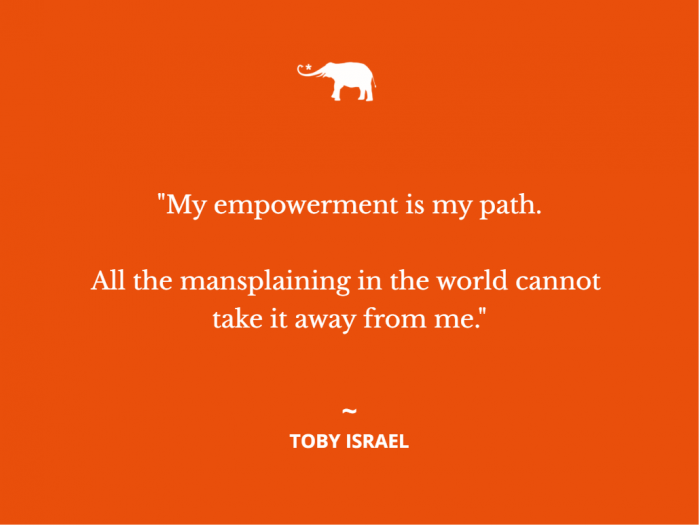View this post on Instagram
I’ve noticed a trend amongst a small demographic made up of men who are angry at me.
It is a brilliant rhetorical strategy that looks more or less like this:
“You call yourself an empowered woman? Then why don’t you __, huh?”
Fill in the blank. Do this thing I think you should do. Conform to my opinion of how empowered women should behave, speak, or otherwise interact with me. Agree with me on this. “If you’re so empowered, why don’t you….?”
Where do I begin? As far as debate strategies go, this one is admirable for its subtle manipulative power and embedded mansplaining. It throws me off balance, into a spiral of self-reflection:
Wait, do I call myself an empowered woman?
If so, does he have a right to challenge me on my self-identification?
Am I acting in line with my values here?
It begs so many questions, I’m not sure which to argue first. Paralyzing.
Here’s the thing. As a trained Empowerment Self-Defense instructor, I have a personal rule about empowerment as it pertains to teaching others:
The first rule of empowerment is: don’t talk about empowerment.
You see, the moment I try to define empowerment for someone else, it ceases to be empowering. The very act of defining it detracts from a student or workshop participant or audience member’s agency—their right to decide for themselves what it is that gives them power, what it means to be in their power.
I can share from personal experience—and often do—about what makes me feel empowered, but I would never tell a student, “You must do this to be empowered.” It would be inherently paradoxical.
In my ESD (Empowerment Self-Defense) classes, workshops, and retreats, empowerment is an outcome and a process, not an imperative. My colleagues and I offer options. Additional tools and techniques to amplify each individual’s personal self-defense toolkit. We offer alternatives and possibilities. We share a plethora of dynamics through which students may very well connect with their personal power, that is, feel empowered.
We walk with them, coach them, cheer them on…but we do not tell them where or how to follow their path to empowerment.
“Empowerment,” the buzzword, is highly problematic. With its undertones of well-intentioned neocolonialism, it lends itself to ideological and narrow-minded rhetoric regarding how women—how human beings—should show up in the world. It tends to suppress a plurality of solutions for personal and collective growth, in favor of dogmatic dictums about the “right” way to be strong, powerful, or free.
“Empowerment,” the process, which I have had the honor to witness dozens if not hundreds of times, is another beast entirely. It is personal. It is complex and often cyclical (self-doubt, empowerment, self-doubt, empowerment—rinse and repeat). It is not one-size-fits-all. And perhaps most importantly, it is often invisible, because what really counts is how I feel, not how I feel to you.
So men, and everyone, don’t tell me what it means to be an empowered woman. (And I won’t tell you, either.)
It is not up to you to define my power.
I can choose not to “play nice,” and I am still empowered.
I can choose to behave “badly,” and I am still empowered.
I can contain a multitude of contradictions, and still be empowered.
I can clash with your ideal of empowerment, and still be empowered.
I can disappoint you, and I am still empowered.
I can disappoint myself, and still be empowered.
I can be naked, and I am still empowered.
I can cover every inch of my skin, and I am still empowered.
I can avoid the term “empowerment” altogether, and still be empowered.
And I can call myself an empowered woman, and I am still empowered.
My empowerment is my path.
All the mansplaining in the world cannot take it away from me.
~
~


 Share on bsky
Share on bsky





Read 4 comments and reply